Latin America and the Caribbean in Orange for the 16 Days of Activism
Date:
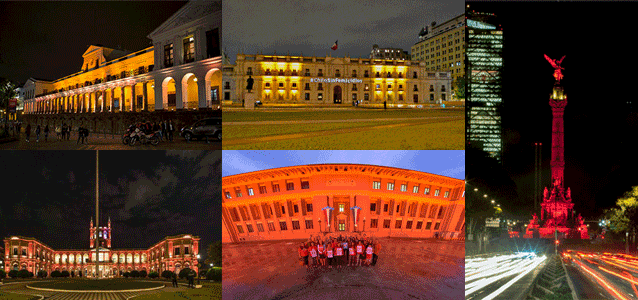
Across the region, mobilization from governments, civil society, the private sector and international organizations has been strong to generate awareness and take action to end violence against women.
Barbados
Standing in your own power, truth and dignity as an individual were the take-aways for final year law students of the University of the West Indies Cave Hill Campus as they participated in a Gender and Human Rights Study Visit to UN Women.
UN Women MCO Caribbean Head of Office a.i. Tonni Brodber explored concepts of gender, power, human rights, gender based violence and the international human rights frameworks including CEDAW during the session to mark the start of the 16 Days of Activism to End Violence Against Women. Exploration of the Access to Justice roadmap for female victims of sexual assault crimes in different jurisdictions was one of the key activities for the students who represent a number of Caribbean nations.
Brazil
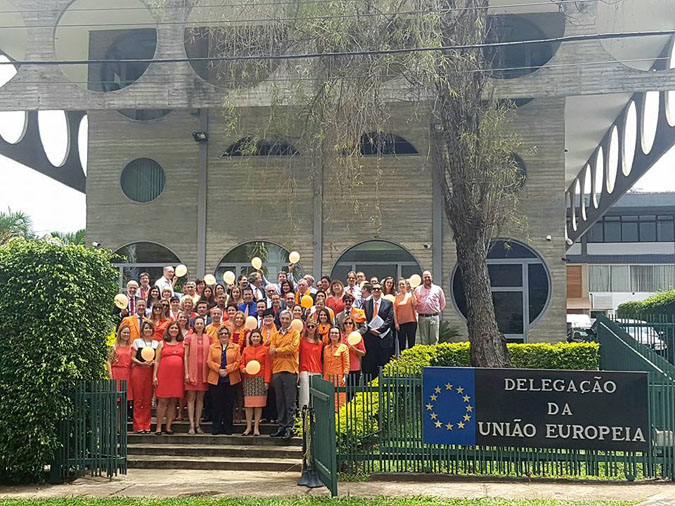
Several emblematic buildings of the capital, Brasilia, joined the call to orange the world, including the Buriti Palace, seat of the government of the Federal District, and the Embassies of France, Germany, Guinea-Bissau, Sweden, the United Kingdom, Egypt, Cuba and the European Union.
Furthermore, the United Nations and the government of the Federal District organized the "Space of the 16 Days of Activism to End Violence against women" in Brasilia. Representatives from the women's movement, universities and public entities were present to discuss, propose solutions and share good practices in the prevention and response to violence based on gender, race and ethnicity in Brazil.
Colombia
Colombian civil society organizations, with support from UN Women, also carried out several initiatives to commemorate November 25 through campaigns, cultural events, talks and advocacy actions. Such is the case of the National Network of Women and its campaign Sin mi puño y con mi letra and the Lunaria Fund, promoter of the campaign #DejameEnPaz, focused on the prevention and reporting of violence against women and girls. The campaign ended with a concert in Bogota’s Plaza Bolivar, where UN Women Representative, Belén Sanz, delivered a speech at the exact moment that the most emblematic buildings of the city were lit in orange: the Congress of the Republic, the Palace of Justice, the Palacio Nariño (Presidential House) and Colpatria Tower, the highest building of the Colombian capital.
Chile
The Palacio de la Moneda, seat of the Chilean government and one of the country's most representative buildings, also illuminated its façade in orange to commemorate the International Day for the Elimination of Violence against Women. Men and women from various parts of Santiago approached the government house to admire its orange lighting and photograph themselves in front of a building that called for a #ChileSinFemicidios (Chile with No Femicides).
Ecuador
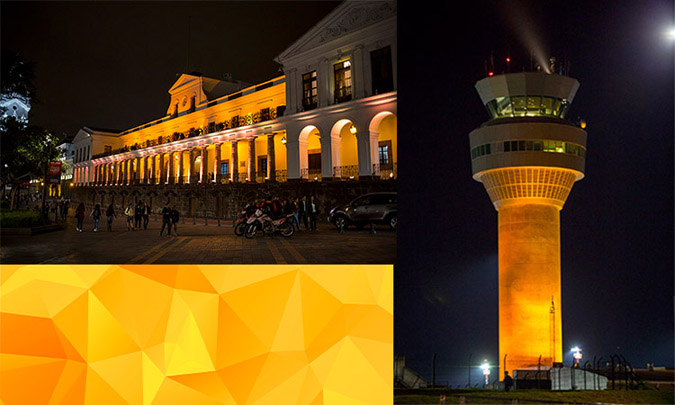
Some of the most important Ecuadorian buildings were also lit in orange, including the Carondelet Presidential Palace, the control tower of the Quito airport and the Mitad del Mundo monument. Meanwhile, thousands of women and men took to the streets of Quito and Guayaquil, united under the slogan #VivasNosQueremos (We Want Us Alive), to reject gender based violence and femicide.
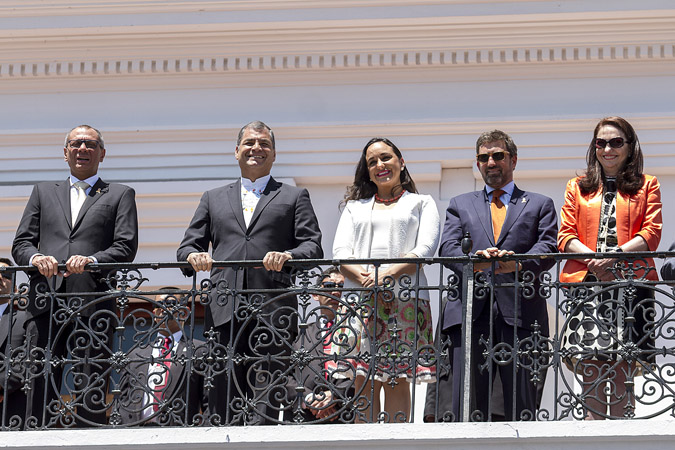
The International Day for the Elimination of Violence against Women was also observed at the Presidential Palace on November 21, with the presence of President Rafael Correa, the President of the National Assembly Gabriela Rivadeneira, members of the Cabinet, UN Women Representative Moni Pizani and members of the UN system in the country.
For the second consecutive year, the Ministry of Justice organized a five-kilometer race in support of actions to eliminate violence against women. More than two thousand people participated in this activity.
El Salvador
UN Women and the National Civil Police (PNC) inaugurated UNIMUJER, an office specialized in assisting women facing situations of violence in the municipality of Santa Ana. As part of its strategy to strengthen attention to women survivors of violence, UN Women has worked with the police force since 2011 in the development of a protocol to provide attention to women who face any type of violence, as well as the institutionalization of these offices.
Also during the 16 days of Activism, the "Violent-Meter" was launched, an initiative of the Ministry of Labor in cooperation with the Salvadoran Institute for the Development of Women (ISDEMU), which promotes decent employment free of violence. The report on the status and situation of violence against women was also presented by ISDEMU. On the occasion, UN Women Representative in El Salvador, Ana Elena Badilla, was presented an award in recognition of her work in favor of women’s rights in the country.
The United Nations building in San Salvador was also lit in orange.
Jamaica
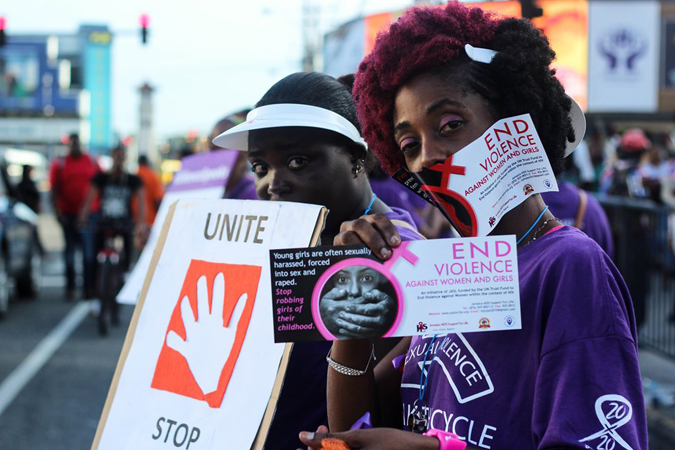
The Silent Protest is a civil society led initiative held on November 25 to commemorate the International Day to Eliminate Violence against Women - in the context of HIV.
Organised by JASL, one of UN Women’s partners, alongside other civil society partners such as WE-Change, Eve for Life and WMW, among others, the protest took place near a major thoroughfare in the capital city Kingston during peak hour traffic.
Many participants cover their mouths to symbolize the high levels of under-reporting of victims and the culture of rape that often pushes women into silence.
This is the second year that this event is being held. JASL gave a tentative headcount of 300 participants.
Mexico
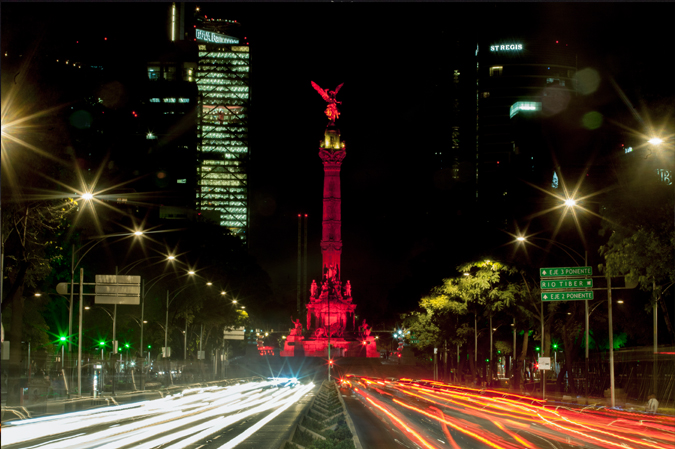
Activities to mark the 16 days of Activism in Mexico kicked off with a press conference of the United Nations System coordinated by UN Women. The country's most important media and social networks strongly echoed the information released and joined the call to put an end to violence against women and girls.
Mexico was also painted in orange beyond the media and virtual world: the most important buildings of Mexico City, Torreon, Puebla and Guadalajara were illuminated in orange.
Another highlight was the BBC 100 Women event, which was supported by UN Women and featured a series of conferences, art exhibitions and concerts related to women's empowerment and the elimination of violence. The Mexican Social Security Institute also adhered to the HeForShe movement. The organization committed to benefit its more than 70 million beneficiaries through a series of actions to address, detect and prevent violence against women and girls.
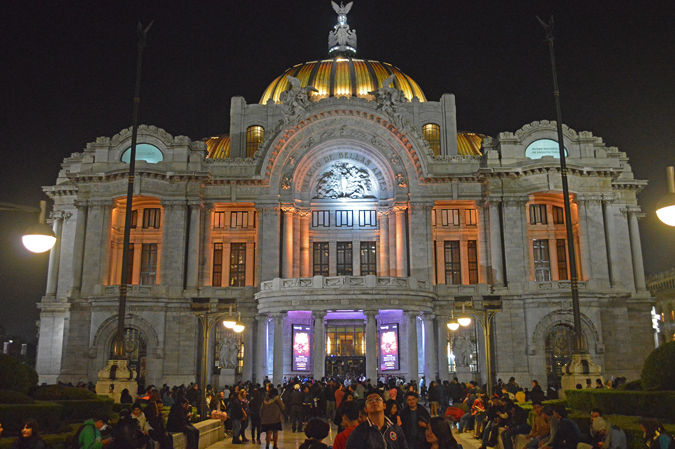
Panamá
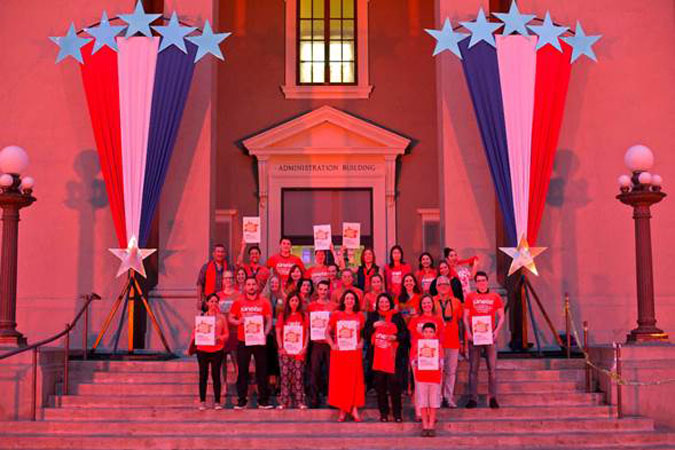
For the second consecutive year, the Panama Canal has joined the 16 Days of Activism by lighting in orange its iconic Administration Building, a landmark of the Panamanian capital. The lighting of the building took place on 25 November, with attendance from staff of UN-Women’s Regional Office for the Americas and Caribbean.
“For over a century, the Panama Canal has linked distant continents and peoples. It is in this same spirit of coming together that we unite today to send a clear message that violence against women and girls is unacceptable and we are honored to have the Panama Canal join us in this initiative”, said Luiza Carvalho, UN-Women Regional Director for the Americas and Caribbean.
The Panama Canal Administration Building was officially inaugurated in 1914, only a month before the Canal became operational. The building is located atop a hill overlooking the Canal itself and most parts of Panama City.
Paraguay
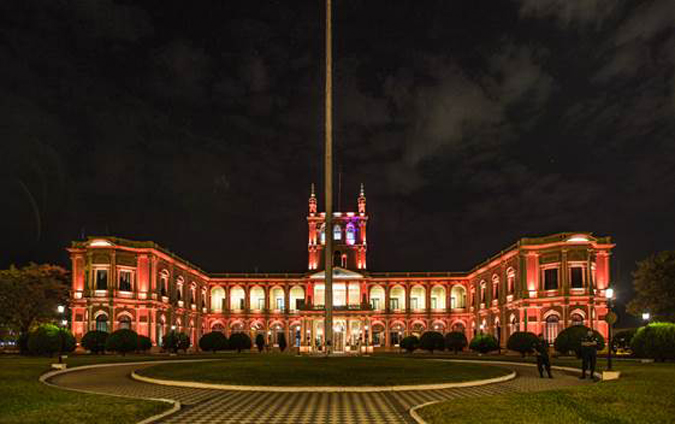
Many buildings in Asuncion were lit in orange: the Government Palace, the headquarters of CONMEBOL, Columbia University, Itaipu Binacional, the Juan de Salazar Cultural Center, the Municipal Theater, the Manzana de la Rivera Cultural Center, the Municipality of Asunción and the United Nations House.
Women from different organizations marched on November 24 calling on citizens to end violence against women, which also included a vigil at the Juan de Salazar Cultural Center.
For its part, the Paraguayan Football Association (APF) called for non-violence against women and girls: in all matches played on November 25 and 26 in the Clausura Tournament, teams displayed a banner with the message "Not one less."
Trinidad y Tobago
The Network of Rural Women Producers of Trinidad and Tobago, UN Women, ParlAmericas and the Parliament of the Republic of Trinidad and Tobago observed the 16Days of Activism with a consultation on "Addressing Gender Based Violence in the framework of the Sustainable Development Goals”.
The event also featured the launch of a web portal developed by UN Women and ParlAmericas which includes tool kits to support parliamentary work in the Caribbean on gender equality.
Uruguay
Men and women occupied the 18 de Julio Avenue, one of the most important roads in Montevideo, dressed in black clothes, protesting silently to reject violence against women. Children dressed in white participated in the march to remind that they also suffer the effects of gender based violence (in Uruguay, seven children were killed last year as an act of revenge against their mothers).